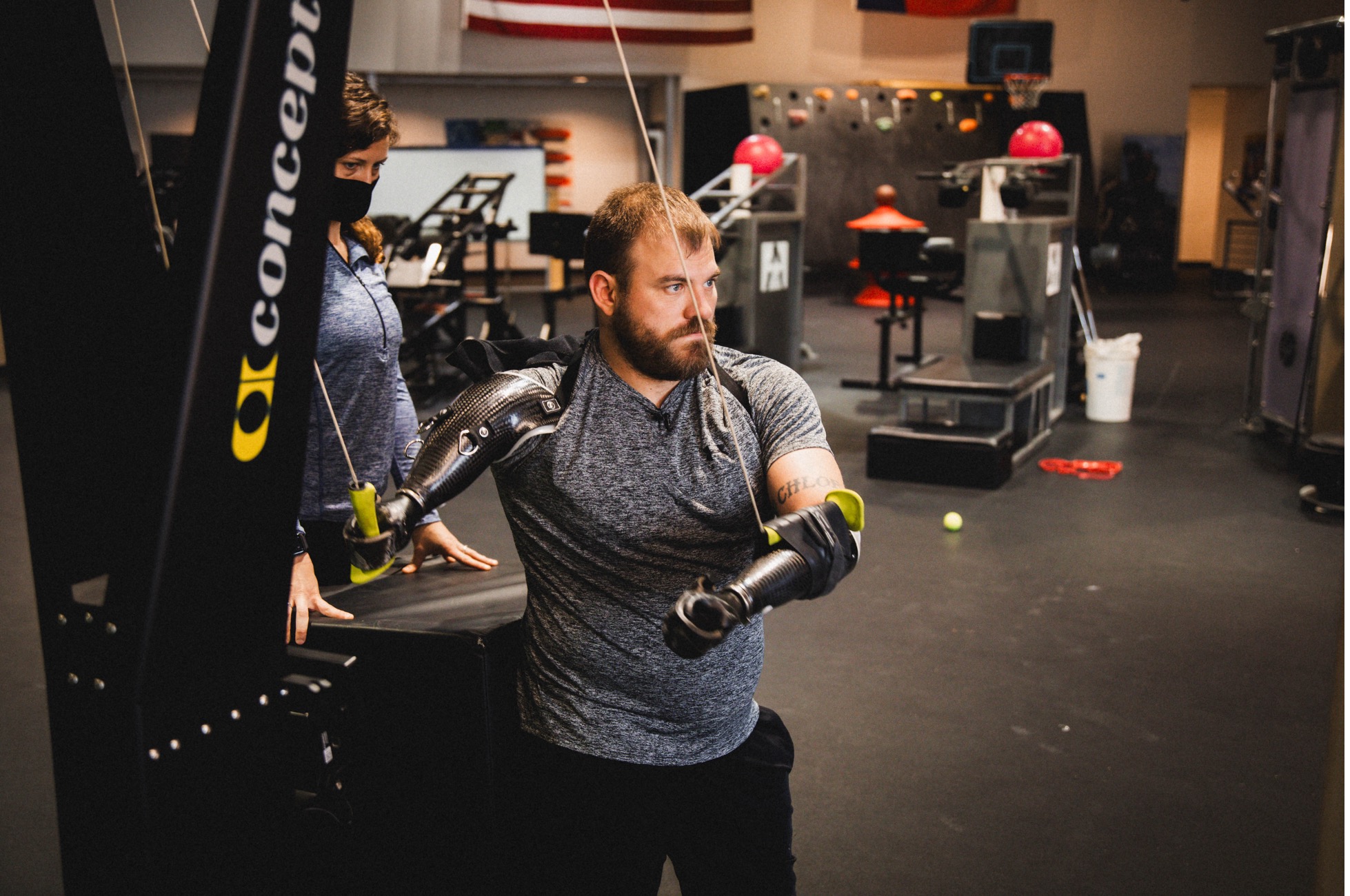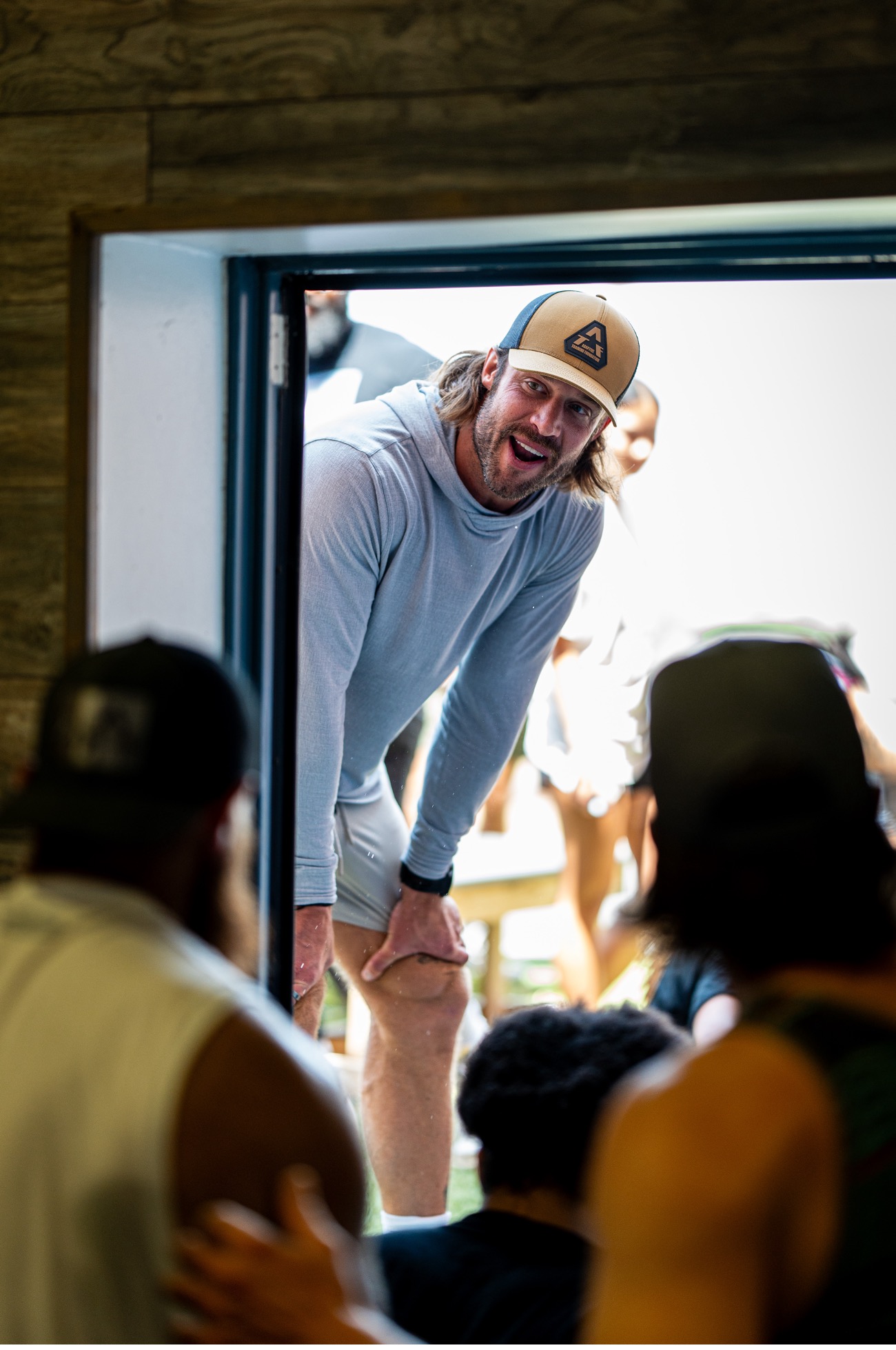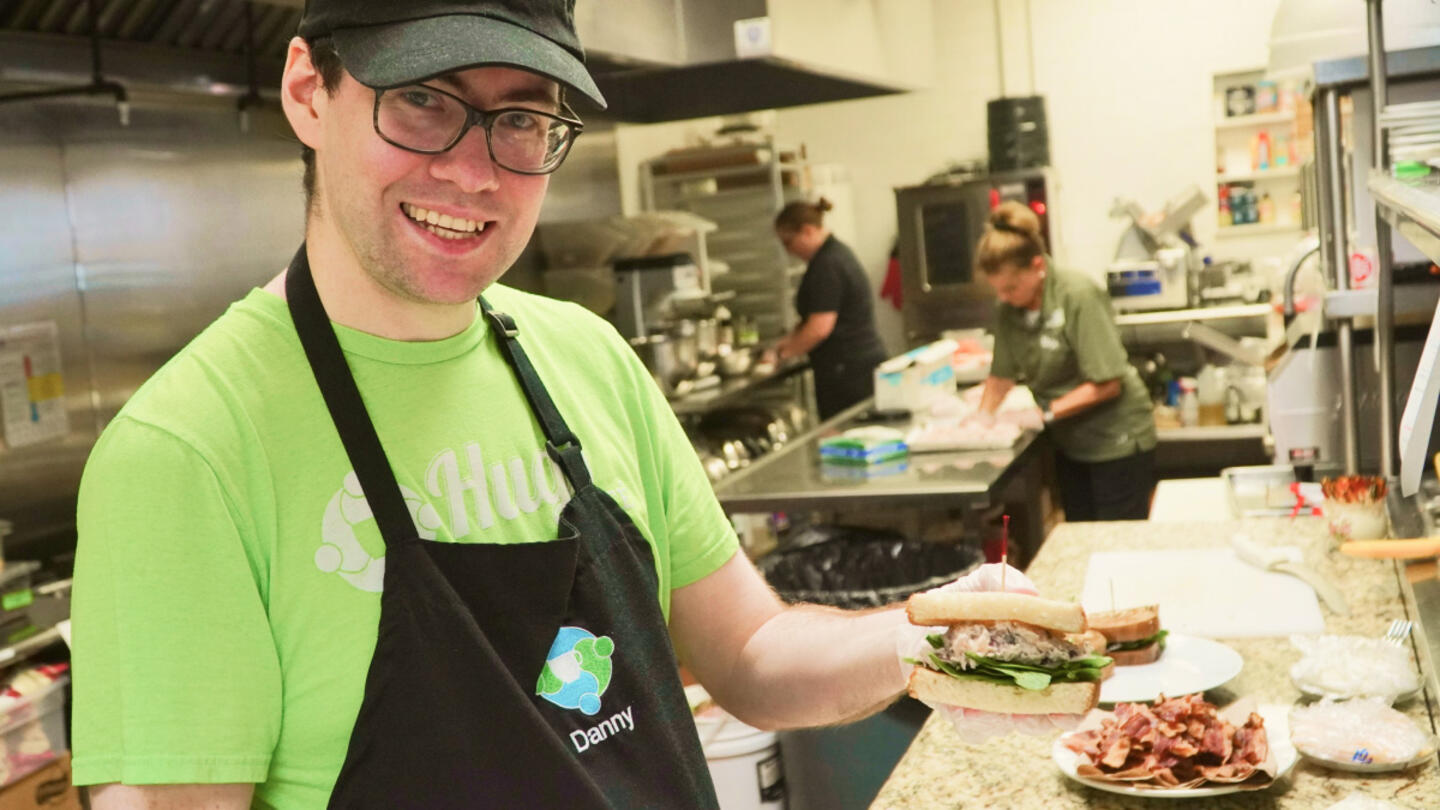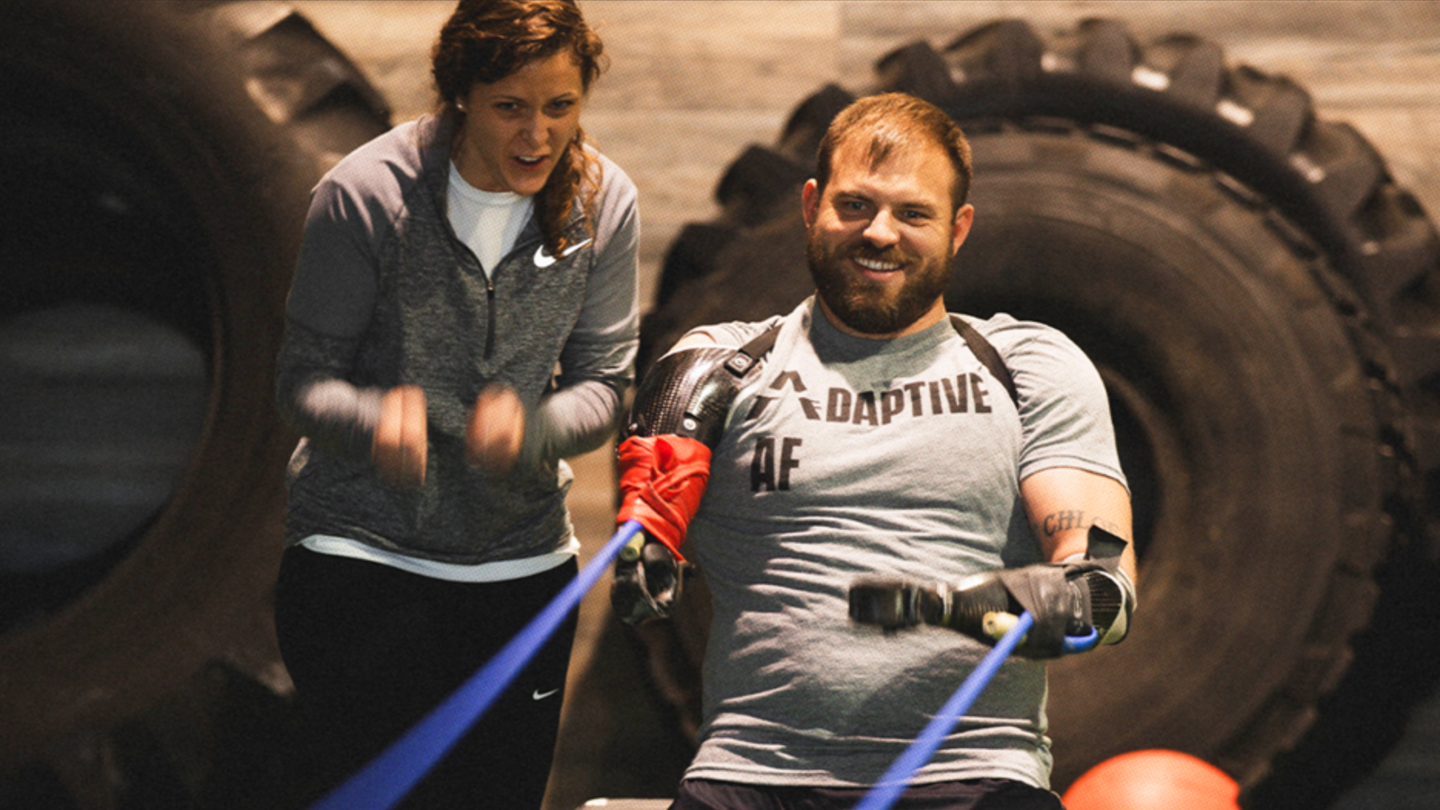The now-renowned Adaptive Training Foundation gym (ATF) started with a surprise birthday party for a Navy SEAL. Little did anyone know that casual get-together would help hundreds of athletes, including many veterans, go from rehabilitation to adapted sport using the power of community.
David Vobora, a retired NFL linebacker turned physical trainer, describes the scene at the party like a coach pursuing a hot new recruit.
“I saw him out of the corner of my eye, and it was so beautiful,” Vobora said. “As somebody who has an eye for human performance ... the way that he was moving on prosthetics was just fascinating to me. And so I booked it over to him and said, ‘Look, when was the last time you worked out?’”
Vobora was describing his first encounter in 2014 with retired Army Staff Sgt. Travis Mills, a quadruple amputee who survived his injuries in Afghanistan. This chance meeting, and the training relationship that followed, spurred a realization in Vobora that would inspire ATF: People who’ve lost limbs and suffered trauma can not only recover, but thrive in competitive sports when mental barriers are removed.
Today, Mills is a celebrated speaker, author, restaurateur, and founder of a foundation hosting post-9/11 recalibrated veterans in Maine. But at the time, he was another severely injured combat veteran left at the crossroad of Walter Reed Medical Center and the rest of his life — and, according to Mills, he needed to lose weight.
The trust factor

Mills knew he needed more than another traditional, run-of-the-mill training program — he needed someone he could trust. Letting a complete stranger into your world of “nubs” and “stumps” and prosthetic limbs, as Mills puts it, was a giant step.
“It takes a lot of trust for anything I do with my prosthetics. I need help every day. My father-in-law, who travels with me, he helps put my legs on every day,” Mills said. “It's kind of intimate … fit the liner rolls on my inner thigh, then the cap, then my leg.”
Prior to his injuries, Mills was the product of his past: high school athlete, combat leader accustomed to a high-testosterone climate where action, not emotions, ruled the roost.
Friendly, dryly humorous, and approachable, Mills admits to guarding his inner world and not letting just anyone in. When first approached by a therapist at Walter Reed, Mills simply gave his name, rank, and date of birth, as if he were a POW in enemy territory.
Hostility or resentment didn’t drive Mills’ reaction, but an understanding he needed more than just therapy and talk to get healthy and whole. He needed what Vobora was offering: a training program where he would be seen as a complete person, not a collection of broken parts.
The ‘aha’ moment
Vobora, who had never previously met an amputee, much less trained one, had an “aha” moment during his initial conversation with Mills: He could help those that suffered trauma get back on their feet by training them like elite athletes.
He saw that Mills had the drive and motivation needed to become an adaptive athlete, and Mills needed a trainer who believed in him.
“It was a master class for me working with a quadruple amputee. It was just a joy to work with somebody who was such a ready and willing guinea pig,” Vobora said.
Even if experimentation didn’t always go as planned.
Sign up for the Strong & Safe Communities newsletter for stories, ideas, and advice from changemakers working with their neighbors to address the biggest problems we face.

“David is just a kid in the candy shop. ‘We'll try this or we’ll try that,’” said Mills. “He had an idea of throwing tennis balls at me. He's like ‘you know, just move your body.’ I said, ‘OK, I'll do my best.’ And he's just hitting me with tennis balls.”
As high-level competitors, neither Mills nor Vobora were interested in taking the old path of rehabilitation but adopted a totally new lens where Mills was seen as an athlete to be challenged, not a handicapped person to be pitied.
In time, Mills responded to Vobora’s transformational vision and training, becoming Exhibit A in the shift from traditional rehabilitation’s reliance on medication and paid clinicians to ATF’s model emphasizing exercise, peer-to-peer counseling, and community.
The Travis Mills Foundation has further developed this concept with a bold alternative to traditional mainstream mental health approaches: Warrior PATHH. As the nation’s first program to cultivate and facilitate post-traumatic growth, Warrior PATHH offers 90 days of training for combat veterans and first responders delivered by peers, or PATHH Guides.
Community plays a role in trauma healing
Though Vobora ensured adaptive training programs were open to anyone, veterans gravitated to ATF. Mills told another amputee veteran about it, who then told another, and soon dozens more.
A decade after that chance meeting, ATF has gone on to train hundreds of veterans, which account for about 70% of the 358 athletes ATF has trained, a number that continues to climb.
Critical to the success of both ATF and Warrior PATHH is the emphasis on community.
“What David does is he'll get people cheering and rooting everybody on, but it's not because they're disabled or because they have something unique about their appearance,” Mills said about Vobora, “It's because we, as a team, want that person to win and to get whatever goal they can.”
Vobora said Mills’ willingness to be nakedly vulnerable and transparent in his new community of adaptive athletes established a critical element of ATF’s culture. “That is what has built this place.”
The greatest challenges are not physical, Vobora said, but mental and emotional.
What began 10 years ago with an impromptu meeting of two men seeking purpose has resulted in hundreds of restoration stories involving adaptive athletes and recalibrated veterans. ATF isn’t slowing down. It’s in the middle of a capital campaign to build a four-acre, 30,000-square-foot training compound outside Dallas.
ATF’s motto, “Defy Impossible,” is still redefining how society can turn trauma survivors into thrivers.
“The only disability is a fixed mindset,” Vobora said.
Learn more about Adaptive Training Foundation:
- Why ATF teamed up with Beast Philanthropy, the nonprofit founded by the world's No.1 YouTuber, MrBeast
- How ATF helped these 3 people become world-class athletes
***
The Adaptive Training Foundation is supported by the Stand Together Foundation, which partners with the nation’s most transformative nonprofits to break the cycle of poverty.
Learn more about Stand Together's efforts to build strong and safe communities and explore ways you can partner with us.

People with disabilities want meaningful work — and Hugs Cafe is making it happen.

At this ‘resort,’ children with intellectual disabilities are seen as gifts to be celebrated and loved.

Veterans experience loss when leaving service. Could this be key to understanding their mental health?

The Grammy-nominated artist is highlighting the stories we don’t get to hear every day.
